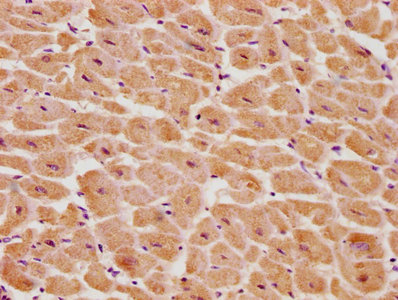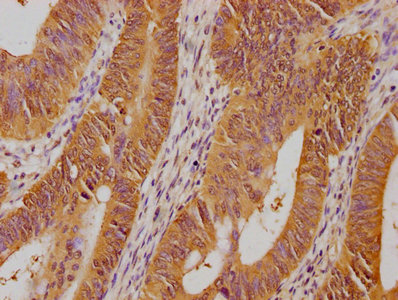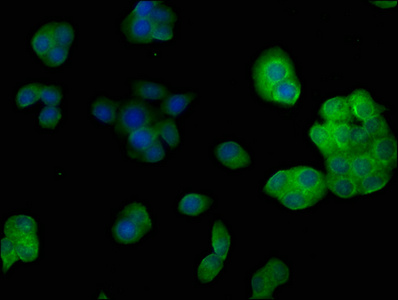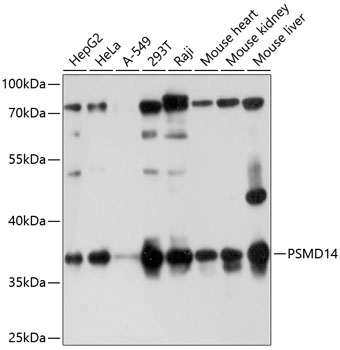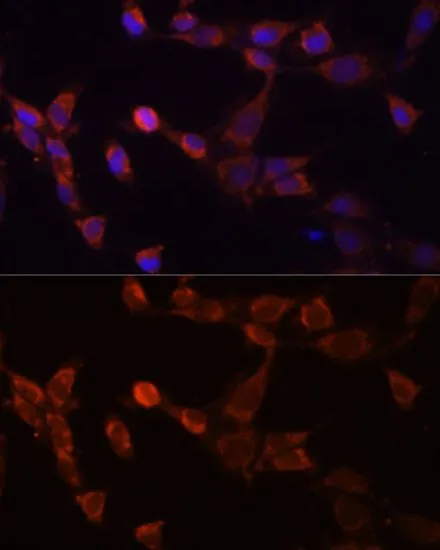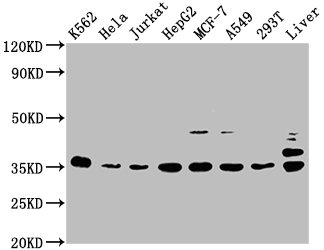
Western Blot Positive WB detected in: K562 whole cell lysate, Hela whole cell lysate, Jurkat whole cell lysate, HepG2 whole cell lysate, MCF-7 whole cell lysate, A549 whole cell lysate, 293T whole cell lysate, Rat liver tissue All lanes: PSMD14 antibody at 1:2000 Secondary Goat polyclonal to rabbit IgG at 1/50000 dilution Predicted band size: 35 kDa Observed band size: 35 kDa
PSMD14 Antibody
CSB-PA018904OA01HU
ApplicationsImmunoFluorescence, Western Blot, ELISA, ImmunoHistoChemistry
Product group Antibodies
ReactivityHuman, Rat
TargetPSMD14
Overview
- SupplierCusabio
- Product NamePSMD14 Antibody
- Delivery Days Customer20
- ApplicationsImmunoFluorescence, Western Blot, ELISA, ImmunoHistoChemistry
- CertificationResearch Use Only
- ClonalityPolyclonal
- ConjugateUnconjugated
- Gene ID10213
- Target namePSMD14
- Target descriptionproteasome 26S subunit, non-ATPase 14
- Target synonymsPAD1, POH1, RPN11, 26S proteasome non-ATPase regulatory subunit 14, 26S proteasome regulatory subunit rpn11, 26S proteasome-associated PAD1 homolog 1, proteasome (prosome, macropain) 26S subunit, non-ATPase, 14, testis tissue sperm-binding protein Li 69n
- HostRabbit
- IsotypeIgG
- Protein IDO00487
- Protein Name26S proteasome non-ATPase regulatory subunit 14
- Scientific DescriptionComponent of the 26S proteasome, a multiprotein complex involved in the ATP-dependent degradation of ubiquitinated proteins. This complex plays a key role in the maintenance of protein homeostasis by removing misfolded or damaged proteins, which could impair cellular functions, and by removing proteins whose functions are no longer required. Therefore, the proteasome participates in numerous cellular processes, including cell cycle progression, apoptosis, or DNA damage repair. The PSMD14 subunit is a metalloprotease that specifically cleaves Lys-63-linked polyubiquitin chains within the complex. Plays a role in response to double-strand breaks (DSBs): acts as a regulator of non-homologous end joining (NHEJ) by cleaving Lys-63-linked polyubiquitin, thereby promoting retention of JMJD2A/KDM4A on chromatin and restricting TP53BP1 accumulation. Also involved in homologous recombination repair by promoting RAD51 loading.
- ReactivityHuman, Rat
- Storage Instruction-20°C or -80°C
- UNSPSC41116161

